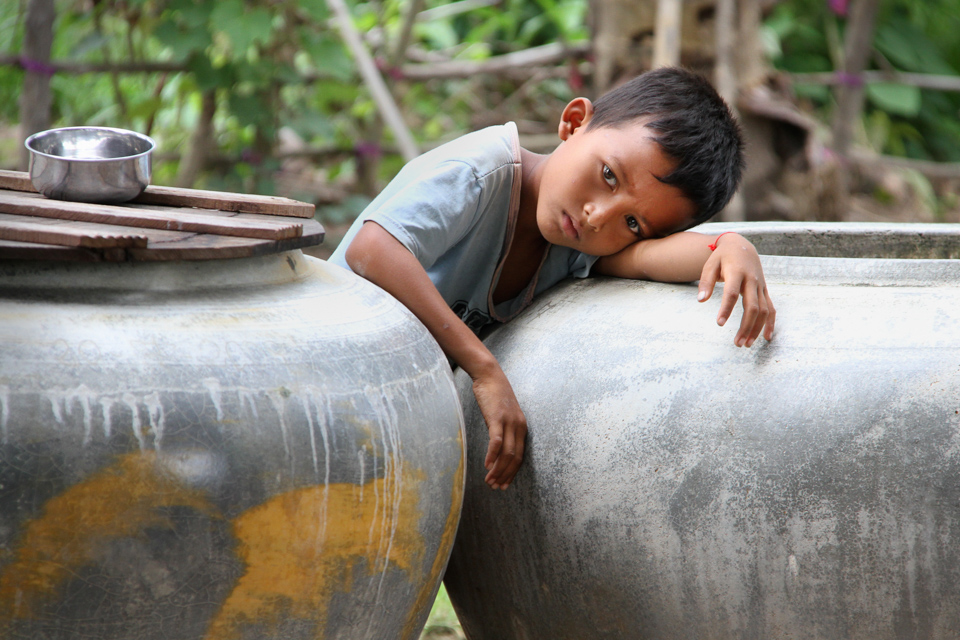How Toilets are Crucial to Raising Smarter Kids in Cambodia
By Colin Meyn
Read original post
Siev Phalla and her family are wholly dependent on the fields around her house, where her family grows rice and vegetables to eat and sell at nearby markets. They also use the area around these fields as a toilet, a practice that is widespread among the 75 percent of Cambodians who live off their land and, according to emerging research, a major contributor to the high rates of malnourishment and slow growth that continue to plague millions of children here.
When Phalla, 47, her husband, or one of their seven children need to relieve themselves, they find a spot on the edge of their land in rural Pursat province, dig a hole, do their business, and cover it up with a thin layer of dirt. For years NGOs here have been trying to convince the 66 percent of rural dwellers who continue to openly defecate outdoors that toilets are a worthwhile investment, but their work has recently taken on greater importance as a crucial part of wider efforts to raise healthier and smarter children.
A few thousand kilometers away in India, Dean Spears, a PhD candidate at Princeton University, has published some compelling findings that show a strong link between sanitation practices and levels of stunting among populations that defecate outdoors. Spears writes, in a research paper on the subject, that the links between sanitation and stunting “suggest that open defecation is a policy priority of first-order importance.”
When people poop outdoors, the particles find their way into water sources and are spread onto food by flies or tracked into the home by humans and animals. Exposure to these fecal germs over time causes intestinal diseases that create small holes in a child’s digestive organs, meaning that much of the food going into their bodies is lost on the way down and the body is unable to turn it into the energy their bodies need to develop.
Spears’ research is a game-changer in Cambodia. “If more people in Cambodia were safely disposing of feces, then children could grow not only taller, but also healthier and smarter, into more productive adults. This is because the same early life health that helps children grow tall also helps their brains grow smart,” Spears wrote in an email.
In the past three years, the sanitation NGO WaterSHED has worked with small businesses throughout Cambodia to produce and sell over 50,000 toilets. Geoff Revell, the regional program manager for WaterSHED, says the emerging science linking sanitation practices to early childhood health may raise the status of sanitation as the government decides what rural development initiatives to prioritize.
“That kind of evidence allows us to go back to those who are supporting nutrition programs and say ‘let’s not have 50 percent of the billion calories that you have just invested in flushed down the toilet due to lack of investment in sanitation,’ ” Revell said. “We know that sanitation, by itself, is not a very high-profile issue, whereas food and nutrition for children is a much higher profile, charismatic issue.”
Even with the science showing the importance of toilets, convincing a population to use them is an abiding challenge. Under the authority of the Ministry of Rural Development, a behavior change campaign was launched last year and has been part of efforts to create what Revell calls a “snowball” effect within communities, where enough people buy in to toilets that open defecation becomes frowned upon.
In a toilet promotion toolkit, created by the social marketing firm 17 Triggers and now being distributed by the government and sanitation NGOs, a series of images is presented to rural audiences in order to build up negative associations with open defecation. In one, a man, with his pants around his ankles, is shown squatting next to a dog. In another, a swarm of flies moves between a pile of poop and a plate of rice.
“Behavior norms are important when it comes to sanitation,” says Revell, and if there was any doubt as to the importance of sanitation NGOs in Cambodia, science is now firmly in their corner.

